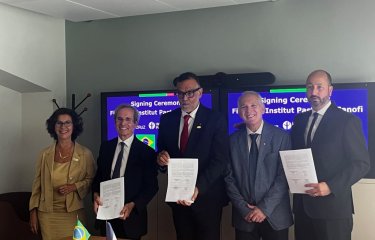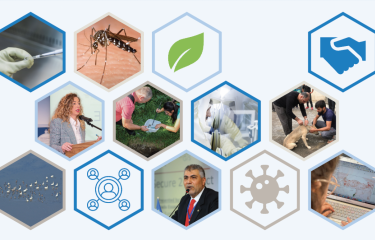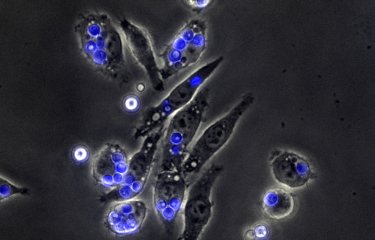The research program BIRDY is focused on bacterial infections, including resistant, in small children. On the occasion of the publication in The Lancet of a correspondence calling for accelerated efforts in research and public health in the fight against neonatal bacterial infection and antibiotic resistance in low-income countries, Dr. Awa Ndir, epidemiologist at the Institut Pasteur in Dakar (Senegal) and project coordinator, answers our questions.

Head of page : BIRDY project, Dakar, Senegal. © Bruno Deméocq / Fondation Total.
Bacterial resistance is well known in the North, does it also affect the South?
Studies have shown that this is really a significant problem in the southern countries, where respect for standard precautions during care and particularly the level of hand hygiene in hospitals is still insufficient. The other major problem is that the prescription of antibiotics is often done empirically without prior bacteriological analysis to identify the germs potentially responsible for the infections. Thus, antibiotic therapy may be inappropriate and therefore inefficient to fight the infection. On the other hand, antibiotics are widely available in parallel markets and they are often consumed without any medical prescription. The quality of the medicines coming from these markets is highly uncertain. All these factors can contribute to the emergence of bacterial resistance.
The scientific objective of the BIRDY project is precisely to assess the impact of resistant bacteria infections in newborns and young children, to understand the risk factors for acquiring these infections and the transmission mechanisms. Severe infections are responsible for more than one third of deaths in the neonatal period. The issue of timely access to an appropriate antibiotic treatment is crucial. The emergence and spread of antibiotic resistance, making treatment more difficult, more expensive or even impossible in the absence of effective antibiotics available could have an impact on reducing mortality.
How is the project implemented concretely in the field?
We offer pregnant women to participate in the program. By actively monitoring the mother and child pair, we have the ability to detect very quickly serious infections and take care of them. Neighborhoods ‘godmothers’ called "Badjenu Gox", involved in community health, identify pregnant women living in the study sites and offer them to join the project. Investigators, who are experienced midwives or nurses, are then responsible for recruiting the pregnant women in the third trimester of their pregnancies. The future mothers then benefit from a complete biological check-up and a search for carriage of group B Streptococcus, which can lead to early and severe infection in the newborn. The babies are then followed by the team of investigators at home during one year. The mothers are also trained to detect early symptoms of infections and to perform daily temperature reading in the first month of the child. When they get sick, the children are taken care of in the hospital by a referent pediatrician. If infection is suspected, samples are taken and the Institut Pasteur of Dakar performs analyses to identify the bacterial or viral origin of the infection.
You also offer training to health workers?
Yes we are strengthening the capacity of health workers, midwives but also matrons who are highly involved during deliveries here in Senegal. We train them at the Institut Pasteur in Dakar to perform vaginal swabs and to take blood samples. We also organize training on the basic care of newborns and neonatal resuscitation for workers in health structures associated to the project, in partnership with referent pediatricians in Senegal. The implementation of this project, through the use of an algorithm for managing infection cases, adapted from WHO recommendations, enables best practices in prescribing antibiotics. The program offers an easier access to the identification of the bacteria causing the infection and also to the determination of its sensitivity to antibiotics in order to adapt the treatment. Ultimately, monitoring the local bacterial epidemiology will be useful to guide doctors' prescriptions, before getting the results of the analysis or when the responsible bacteria could not be identified. It is therefore essential to strengthen the capacity of laboratories that play a central role in the management of infections in children and to encourage the development of rapid diagnostic tests easily used in low-income countries.
Learn more about BIRDY project
Read the correspondence calling in The Lancet
The research project BIRDY is currently implemented in three sites:
- in Madagascar, the project is executed in partnership with the Institut Pasteur de Madagascar and with the support of the Principalty of Monaco,
- in Senegal in partnership with the Institut Pasteur de Dakar with the financial support of the Total Corporate Foundation,
- in Cambodia in partnership with the Institut Pasteur du Cambodge with the support of MSD AVENIR.
Mis à jour le 19/02/2016
For more information, please visit





